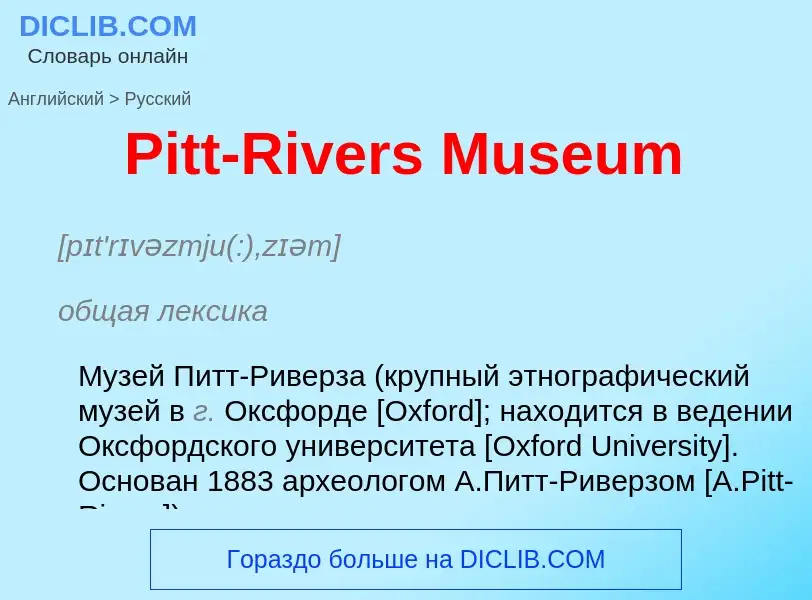Traducción y análisis de palabras por inteligencia artificial ChatGPT
En esta página puede obtener un análisis detallado de una palabra o frase, producido utilizando la mejor tecnología de inteligencia artificial hasta la fecha:
- cómo se usa la palabra
- frecuencia de uso
- se utiliza con más frecuencia en el habla oral o escrita
- opciones de traducción
- ejemplos de uso (varias frases con traducción)
- etimología
Pitt-Rivers Museum - traducción al Inglés
[pɪt'rɪvəzmju(:),zɪəm]
общая лексика
Музей Питт-Риверза (крупный этнографический музей в г. Оксфорде [Oxford]; находится в ведении Оксфордского университета [Oxford University]. Основан 1883 археологом А.Питт-Риверзом [A.Pitt-Rivers])
['pɪtklʌb]
общая лексика
"Питт клаб" (клуб отдыха и развлечений студентов-спортсменов из состоятельных семей в Кембриджском университете [Cambridge University]; членство ограничено 220 чел. Основан в 1835)
[mju:'ziəm]
общая лексика
музей
существительное
общая лексика
музей
Definición
Wikipedia
Pitt Rivers Museum is a museum displaying the archaeological and anthropological collections of the University of Oxford in England. The museum is located to the east of the Oxford University Museum of Natural History, and can only be accessed through that building.
The museum was founded in 1884 by Augustus Pitt Rivers, who donated his private collection to the University of Oxford with the condition that a permanent lecturer in anthropology must be appointed. Edward Burnett Tylor thereby became the first lecturer in anthropology in the UK following his appointment to the post of Reader in Anthropology in 1885. Museum staff are still involved in teaching archaeology and anthropology at the university. The first curator of the museum was Henry Balfour. A second stipulation in the Deed of Gift was that a building should be provided to house the collection and used for no other purpose. The university therefore engaged Thomas Manly Deane, son of Thomas Newenham Deane who, together with Benjamin Woodward, had designed and built the original Oxford University Museum of Natural History building three decades earlier, to create an adjoining building at the rear of the main building to house the collection. Construction started in 1885 and was completed in 1886.
The original donation consisted of approximately 22,000 items; this has now grown to more than 500,000 items, many of which have been donated by travelers, scholars, and missionaries.








![[[Anne Frank House]], [[Amsterdam]], Netherlands [[Anne Frank House]], [[Amsterdam]], Netherlands](https://commons.wikimedia.org/wiki/Special:FilePath/Amsterdam (NL), Anne-Frank-Huis -- 2015 -- 7185.jpg?width=200)
.jpg?width=200)
. Moai; an ancestor figure, made by the Rapanui people. 1000-1200 CE. From Orongo (Polynesia, Easter Island); probably made in Rano Kao. British Museum.jpg?width=200)

.jpg?width=200)



![[[Grand Egyptian Museum]], [[Cairo]], [[Egypt]] [[Grand Egyptian Museum]], [[Cairo]], [[Egypt]]](https://commons.wikimedia.org/wiki/Special:FilePath/Grand-Egyptian-Museum-3.jpg?width=200)
.jpg?width=200)
![[[National Museum of Iran]], [[Tehran]], [[Iran]] [[National Museum of Iran]], [[Tehran]], [[Iran]]](https://commons.wikimedia.org/wiki/Special:FilePath/Lower Paleolithic fossils from Darband Cave, Paleolithic hall, National Museum of Iran.jpg?width=200)

![[[National Museum of African American History and Culture]], [[Washington, D.C.]], United States [[National Museum of African American History and Culture]], [[Washington, D.C.]], United States](https://commons.wikimedia.org/wiki/Special:FilePath/National Museum of African American History and Culture in February 2020.jpg?width=200)


![[[House of Slaves]], a museum and memorial to the [[Atlantic slave trade]], in [[Gorée]], Senegal [[House of Slaves]], a museum and memorial to the [[Atlantic slave trade]], in [[Gorée]], Senegal](https://commons.wikimedia.org/wiki/Special:FilePath/Senegal Gorée (8).jpg?width=200)
![[[Mausoleum of the First Qin Emperor]] Site Museum in [[Shaanxi]] province, China [[Mausoleum of the First Qin Emperor]] Site Museum in [[Shaanxi]] province, China](https://commons.wikimedia.org/wiki/Special:FilePath/秦始皇帝陵文物展馆 - panoramio.jpg?width=200)
